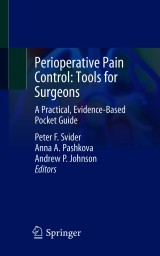Details

Perioperative Pain Control: Tools for Surgeons
A Practical, Evidence-Based Pocket Guide|
96,29 € |
|
| Verlag: | Springer |
| Format: | |
| Veröffentl.: | 21.01.2021 |
| ISBN/EAN: | 9783030560812 |
| Sprache: | englisch |
Dieses eBook enthält ein Wasserzeichen.
Beschreibungen
<div>According to the Centers for Disease Control and Prevention (CDC), there were nearly 40,000 opioid-related deaths in the U.S in the last year alone. These numbers have increased considerably for a variety of reasons, and the growing role of prescription drug abuse has been widely recognized. There has also been increasing consciousness of the lack of dedicated and formalized training dedicated to prescription of analgesics, particularly among surgical trainees and practicing surgeons. Recent studies demonstrate that only a small minority of training programs mandates any opioid prescribing education, despite the fact that nearly all programs allow trainee prescription of opioids on an outpatient basis. Therefore, it is not surprising that despite a growing body of literature illustrating the value of opioid alternatives and adjuncts, practicing surgeons in all specialties largely ignore these evidence-based practices and continue to prescribe opioids in situations for which alternatives are proven, safe, and effective. </div><div> There are many reasons for preparing a concise and practical resource describing evidence-based practices targeting surgeons and surgical subspecialists, including but not limited to: (1) The exponential increase in prescription drug abuse associated with the “opioid epidemic,” as surgeons play an important role in managing perioperative and chronic pain in a variety of practice setting; this issue bears importance from the patient, physician, and policymaker standpoint; (2) With increasing recognition of the role of quality improvement in patient safety initiatives, and literature demonstrating inadequate opioid prescribing education (OPE) in surgical training programs, it is only a matter of time before accreditation bodies including the ACGME incorporate strong recommendations and mandates for OPE; (3) Myriad literature demonstrating the existence of evidence-based alternatives to opioids – All surgeons and surgical subspecialists would benefit from a practical guide concisely laying this literature out. We feel that surgeons of all experience levels may benefit, ranging from the first year surgical intern to an experienced practitioner trying to remain compliant with the evolving opioid regulatory environment.</div><div><br></div><div>Hence, the appropriate target audience for this text would be for the tens of thousands of current surgical trainees in many specialties, including general surgery, thoracic surgery, otolaryngology, plastic surgery, urology, gynecology, vascular surgery, neurosurgery, and orthopedic surgery. Furthermore, surgeons out of training would be another audience of interest, as there are increasing courses for continuing medical education based on perioperative and chronic pain management. Currently, there are no comparable and competitive guides with these target audiences; all of the existing literature about perioperative and chronic pain is targeted either specifically for patients, anesthesiologists, or pain medicine physicians. This will be the only up to date guide focusing on evidence-based practices for perioperative pain control, and each section will also include information on chronic pain sequelae relevant to each surgical specialty. The editors envision this text being an interdisciplinary endeavor, incorporating surgeons from multiple specialties, anesthesiologists, pain medicine physicians, and palliative physicians as appropriate. </div><div><br></div>
Perioperative Pain Control: Practical Tools for Surgeons.- The Surgeon's Role in the Opioid Epidemic.- Pain Prescription Legislation: What You Need to Know as the Surgeon.- Opioid Prescribing Education in Surgical Training (Follow COP).- Pre-operative Optimization.- Non-Opioid Adjuncts and Alternatives.- Post-Operative Analgesia for the Chronic Pain Patient.- Non-Enteral Pain Management.- Perioperative Annalgesia in General Abdominal, Vascular, and Thoracic Surgery.- Perioperative Analgesia for Thyroid and Parathyroid Surgery.- Evidence-Based Perioperative Analgesia for Otolaryngology-Head and Neck Surgery.- Perioperative Analgesia in Cranial and Skull Base Surgery.- Perioperative Analgesia for Orthopedic and Spine Surgery.- Evidence-Based Perioperative Analgesia for Urologic Surgery.- Obstetrics and Gynecology.- Perioperative Analgesia and Pain Management in Pediatric Patients.- Approaches to Perioperative Pain Management in the Plastic Surgical Patient.
Peter F. Svider, MD, <div>Rhinology and Endoscopic Skull Base Surgery </div><div>Rutgers New Jersey Medical School</div><div>Newark, NJ</div><div>USA. </div><div><div><br></div><div>Andrew P. Johnson, MD</div><div>Department of Otolaryngology</div><div>University of Colorado </div><div>Boulder, CO</div><div>USA</div><div><div><br></div><div>Anna Pashkova, MD</div><div>Pain Medicine, Anesthesiology </div><div>Columbia University Irving Medical Center</div><div>New York, NY</div><div>USA</div><div><br></div></div></div>
This comprehensive text is an easy-to-access reference that provides a foundation for understanding contemporary evidence-based practices relating to pain management in the perioperative setting. Chapters review the exponential increase in prescription drug abuse associated with the “opioid epidemic”; surgeons’ important role in managing perioperative and chronic pain in a variety of practice settings; the role of quality improvement in patient safety initiatives; inadequate opioid prescribing education (OPE) in surgical training programs; and literature demonstrating the existence of evidence-based alternatives to opioids.<p>Written and edited by experts in the field of anesthesiology and pain medicine, <i>Perioperative Pain Control: Tools for Surgeons</i> is a practical resource for surgical trainees and surgeons of all specialties including general surgery, thoracic surgery, otolaryngology, plastic surgery, urology, gynecology, vascular surgery, neurosurgery, and orthopedic surgery.</p>
Written by experts in the field Includes a review of evidence-based alternatives to opioids Provides information and guidelines to managing chronic pain within each surgical specialty
Diese Produkte könnten Sie auch interessieren:

Razum prestupnika i logika prestupleniya. O psihiatrii, sudah i seriynyh ubiytsah

von: Shohom Das, Dmitry Chepusov

6,99 €

Samoe glavnoe o zhenskom zdorove. Voprosy nizhe poyasa

von: Elizaveta Grebeshkova, Olga Sedova

9,99 €















